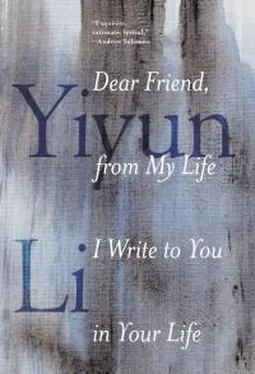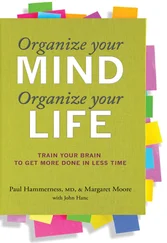After I left the hospital for the second time, I attended two days of volunteer training at a hospice service—to sit with the dying, as that was the only task legally allowed for a volunteer. Many speakers came: doctors, nurses, social workers, office managers, a spiritual healer, a chaplain, veteran volunteers, family members. My favorite speaker was a former ballet dancer, who started his talk with a song, the lyrics taken from an Emily Dickinson poem; when he finished singing, his pink shirt was drenched with sweat, and he left the audience in tears. My least favorite was the woman who ran the volunteer program. She was newly married and spent the time before the training and during the breaks showing a slideshow of her wedding and honeymoon. Isn’t he handsome? she asked, insisting on confirmation from the room. She also pointed out an old friend of the bridegroom, who, drunk before the ceremony ended, had cut and stolen a piece of her wedding cake. She made it clear to this man to stay away from the marriage.
Both tragedy and comedy allow us to experience solid emotions, which are possible to share. Sorrow becomes less excruciating, laughter more resonant. Melodrama puts us on guard. We are the uneasy enemies of our own melodramas as much as other people’s.
—
JUNE 2014. AS I write today, the world is inundated with images of and opinions on the Tiananmen Square massacre from twenty-five years ago. Everything is said with certainty. People, especially those watching a tragedy from afar, talk with such eloquence. Anger, grief, idolization, and idealization of a historical event full of discrepancies, untrustworthy characters calculating on both sides with people’s lives as betting chips, farces even—these feelings are readily expressed with an arrogance similar to Mann’s. Those who speak without understanding have no trouble finding center stage.
When I was reading the news earlier, a random memory, which I had forgotten, returned to me. My sister was in medical school then, and went with her classmates to Tiananmen Square to help the students on hunger strike. From one of the visits she brought back a sun hat for me. Made of thin white muslin and shaped like a Victorian bonnet, it was called a Jane Eyre hat, and I had always wanted one. After the massacre, the hat vanished. No doubt my father, who had gone to a nearby hospital to count bodies the day after the bloodshed, was the one to have purged it. As an item donated to the protest it might incriminate my sister.
Melodrama is that Jane Eyre hat. To make sense of the memory I would have to go through decades of history; I would have to intrude into other people’s pasts. Nevertheless it would be a futile effort. I could parse tragedy and comedy on all levels—national and familial and personal—yet the Jane Eyre hat would remain elusive. I would never be able to explain why its memory made me weep.
That flimsy object could be turned into something more than it was—a symbol or a metaphor; it would become much less than what it was. Melodrama, stubborn, refuses such transformation.
—
TO ARGUE FOR and against melodrama, as with suicide, is to argue against myself. As one in the audience, I have been suspicious. I have occupied melodrama, too. Yet this experience is what makes me not dismiss melodrama. To understand it, I offer this hypothesis: memory is melodrama; melodrama preserves memory.
Memory is a collection of moments rearranged—recollected—to create a narrative. Moments, defined by a tangible space, are like sculptures and paintings. But moments are also individual notes of music; none will hold still forever. In the instant they are swept up in time—in that shift from space to time, memory is melodrama.
Yet melodrama has not much chance to survive. Not brave enough in that instant, we miss the music and are left to replace it with interpretation. If we do capture the music we regret the action—it is hard to live with melodrama. Time brings an audience—external critics and censoring self, adept at tainting, diminishing, or even erasing the melodrama. But time, that fatal enemy of memory, presents itself as an ally when memory agrees to be excised and spliced into optimized existence. The music turns less unbearable, more fragmented; what remains is an altered score.
In the end, memory has two forms, neither exempt from distortion: as melodrama and as adaptation. One holds on to the latter so the former does not make a shipwreck of one’s mind. Shorn of the melodrama, though, what does one have but an empty life of busyness?
—
ON SEPTEMBER 18, 1940, the SS City of Benares, a British ship heading to Canada, was attacked by a German U-boat. The passengers included ninety children, and seventy-seven of them were lost. This ended the British government’s wartime evacuation of children overseas. Not on the ship and thus not lost was Eva Altmann, age eleven, who had at about the same time boarded another ship that was headed to New York. Eva was the niece of Lotte Zweig. By then the Zweigs—having been uprooted by the Nazis and having migrated from Austria to England to New York and eventually to Brazil—had settled in Petrópolis, where they would live until they committed suicide two years later.
The Zweigs—who had arranged the papers for Eva’s travel and secured a host family for her (“you may be both sure that we will look after her and bring her back grown-up and perhaps with a Yankee-accent,” Stefan wrote to her parents)—received cables informing them of Eva’s safe arrival just before the news of the SS City of Benares reached them. “The shock of reading in the paper the news of the disaster, was as great for us as it was for you, and I can understand how you feel about it,” Lotte wrote to her brother and sister-in-law. “That thought haunted us for days. Fortunately your cable had arrived the night before….Well, at least she is safe…”
That thought was unspecified in the letter—the descent into hell does not have to be imagined fully. Lotte moved on to describe the exotic, peaceful landscape of Petrópolis. Well, at least she is safe. The sentence, both candid and off-putting, stood out when I read the letter. This was between the two hospital stays; I often saw in people’s efforts to make someone feel better a dismissal.
The sentiment expressed in that phrase, well, at least, is familiar, in wartime as well as in everyday life. Around the same time as the sinking of the SS City of Benares, a mother in Shanghai lost her young son to diphtheria. Well, at least, no doubt people pointed out—if they took the trouble to console her—she had two older children, and a new one on the way.
A glimpse into the depth of other people’s misfortunes makes us cling to the hope that suffering is measurable. There are more sorrowful sorrows, more despondent despondencies. When we recognize another’s suffering, we cannot avoid confronting our own, from which we escape to the thought of measurability. Well, at least, we emphasize. Our capacity to console extends only to what we can do to console ourselves.
The Zweigs’ letters were written in English. The recipients—Lotte’s brother, sister-in-law, and mother—lived in England then, and letters in German would have been checked more closely. To read Stefan’s letters in the original language appeals to me, as I have only read his books in translation. To read Lotte’s words is important, too; after all, she made the decision to end her life at a rather young age.
Their letters from Brazil, especially the later ones, are shrouded in melancholy. Toward the end of their lives, several times Lotte describes how they sit on their front steps between eleven and noon, watching, often in vain, for the postman to bring letters from Europe and America. “We have the impression to be still more away from you than ever,” Stefan wrote. Waiting is treacherous. Rather than destroying one with the clean stroke of catastrophe, it erodes the foundation of hope. “We are looking every days [ sic ] through all the newspapers for good news,” Stefan wrote around the time when he was arranging for Eva’s travel. The next year, working on a biography of Montaigne he would not finish, he wrote: “It is good to read Montaigne in these days and all those who give good lessons in resignation.”
Читать дальше












